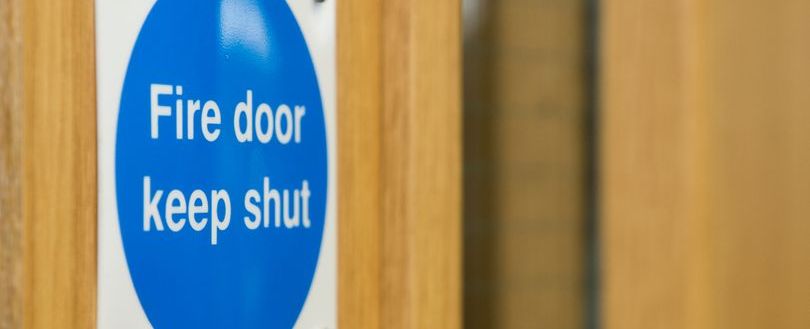
Housing providers urged to put processes in place as new fire door requirements come into force
Like it? Share it!
23 January 2023
Regulations requiring regular checks on fire doors under the Fire Safety Regulations 2022 come into force today and mark a major new addition to the sector’s regular safety responsibilities.
The rules require ‘responsible persons’ to carry out quarterly checks on doors in communal areas, and annual checks on flat entrance doors in buildings taller than 11 metres.
These follow the recommendation of the Grenfell Tower Inquiry in October 2019, which suggested more regular checks in a wider range of buildings.
The inquiry found that the catastrophic failure of ‘self-closing’ devices on flat entrance doors in the tower was a major contributing factor to the rapid loss of ‘compartmentation’ inside Grenfell Tower.
As the first residents to be affected fled their homes, their doors did not swing shut behind them, which meant thick, choking smoke rapidly filled the tower’s lobbies and prevented other residents from escaping.
It later emerged that two-thirds of the tower’s doors had broken or were missing self-closers, despite repeated warnings from the London Fire Brigade to landlord the Royal Borough of Kensington and Chelsea and a ‘deficiency notice’ served in November 2016 specifically raising this issue in regard to Grenfell Tower.
Failing self-closers were also a major contributing factor to the Bronx fire in New York in January last year, which killed 17 people including eight children.
Research last year by the Fire Door Inspection Scheme warned of a "tragedy waiting to happen" after revealing that 100,000 inspections it carried out, produced a failure rate of 75%.
The new regulations require providers to check entrance doors on a ‘best endeavours’ basis, with sector experts saying the checks should be treated in a similar way to mandatory annual safety checks on gas boilers.
Mark Foxcroft, a partner at Devonshires, said: “It’s likely that ‘best endeavours’ requires more steps to be taken to ensure compliance than if the term ‘reasonable endeavours’ had been used.
“It requires the interpretation of the courts, but the government’s recent guidance suggests that the responsible person will need to get an injunction order to compel an inspection where they can’t get access.”
He added: “The duty is annual from 23 January, so duty holders will have a year to get these first checks done. What we are really stressing with clients is that it is necessary to have policies and procedures in place, and then to ensure you have sufficient personnel to put them into practice as soon as possible.”
Sir Martin Moore-Bick, chair of the Grenfell Tower Inquiry, had initially recommended quarterly checks in all buildings with multiple dwellings, regardless of height.
But when the government first consulted on implementation, it suggested limiting this to every six months in buildings taller than 18 metres and annually in blocks between 11 and 18 metres. The final regulations have further diluted this to annual checks for buildings of all heights.
It is understood concerns have been expressed about a building owner or manager’s ability to gain access to a property so frequently in order to carry out the checks.
It is also understood that the cost of the inspections are likely to be passed on to leaseholders in private buildings, as most leases provide for statutory compliance inspections to be recharged.
However, the cost is far lower than intrusive cladding tests and will not add much to existing bills for gas and electrical safety checks.
Where a door needs to be replaced, the cost may sit with the leaseholder depending on the terms of the lease.
The law will be enforced by local fire and rescue services, but it is likely the Regulator of Social Housing will also oversee housing providers’ compliance, as it currently does with gas safety and other statutory safety requirements.
In an instance where the social landlord is not the freeholder of the building, for example where they have purchased flats to be used as affordable homes from a private builder, Mr Foxcroft said it is important to ensure the right entity is complying with their responsibilities, which would depend on the circumstances.
“The law puts the onus on the responsible person, but it is not always immediately clear who that is,” he explained.
“If the lease makes the freeholder responsible for the safety and maintenance of common parts, they are likely to be responsible for complying with the requirements.”
Read the Goverment Regulations here: Fire Safety (England) Regulations 2022 - GOV.UK (www.gov.uk)
Our eNews provides regular insight into industry trends, news headlines, and product and service information. For news articles parallel to those mentioned above, sign up for our eNews. Click here to sign up: Subscribe to our enews (fia.uk.com)
Related training
Related news
-
Record Rise in E-Bike and E-Scooter Fires Across London
28 January 2026
Related resources
-
Fire Risk Assessors Standard Scope of Services
07 August 2025
-
Passenger Service Vehicle - Guidance Note
05 September 2023
